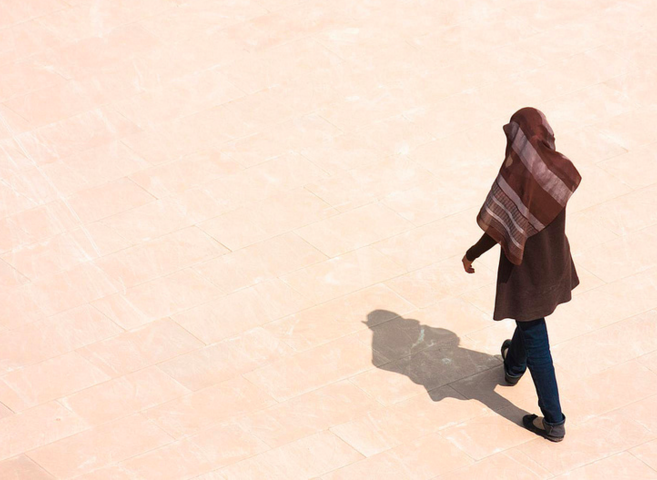
“The women’s struggle against ISIS unfortunately goes even deeper than the atrocities exposed in the video.”
by Alec Hernández
[divider]
[dropcap]A[/dropcap] throng of ISIS fighters lined the walls of a humble living room. Some sit on a tattered couch while others remain on the floor or stand in the periphery, their assault weapons leaned against the wall. The banter between them, caught on a cellphone by an unsteady hand, records a conversation that the entire world would later witness on the news. The men quip back and forth about selling women into slavery, bartering for them in the sex trade, and physically or sexually abusing them as “spoils of war.” One soldier reads a note from Abu Bakr al-Baghdadi, ISIS’s self-proclaimed leader, that explains to the soldiers that a non-Muslim woman would officially be converted to Islam if raped by ten different ISIS recruits. The most obvious threats that ISIS poses is the one to both Islam and the Middle East. It crowds our cable news with images of coalition air strikes and Kurdish ground forces caught in a crossfire. But, this video tells another side of the story – a side of the story often muted amidst explosions and gunfire. Levantine women face one of the Islamic State’s most brutal evils, and it is often a silent fight with consequences that scar as deeply as battle wounds.
The women’s struggle against ISIS unfortunately goes even deeper than the atrocities exposed in the video. Often times, women are separated from their families and forced to travel with battalions of ISIS soldiers as they attempt to spread their “caliphate” across the Levant. Accounts of women escaping are few and far between, however it does happen. With each return, new narratives of brutality and resilience emerge and hold an international spotlight for a day at most, only to refocus on raucous warfare. At the end of last year, the New York Times reported over 5,200 Yazidi women kidnapped by ISIS and over 3,000 still in custody of ISIS community leaders. Other reports from the region depict the Islamic State’s brutal rape culture that subjects women to seemingly endless gender-based violence. Survivors of these kidnappings recount stories of being separated from the men in their village by ISIS soldiers and taken to female-only locations. The Islamic State has made clear their intentions to dehumanize women, whether Muslim, Christian, or Yazidi. Under the guise of anti-western rhetoric and radical jihad, ISIS has waged a separate war against women.
Few countries have made post-capture or post-trauma women’s empowerment a central aspect in the fight against ISIS, but some of the best work in the region is being done through NGOs on the ground with Syrian refugees.
The Collateral Repair Project (CRP), an Amman-based NGO that offers support to urban Syrian refugees, has placed women’s empowerment at the forefront of their community. Beyond their consistent financial support for these refugee families, CRP combats the community fissures left by the flight from Syria and Iraq. With the Islamic State’s atrocities in mind, several members of the community come together for a weekly meeting on women’s empowerment. Crowded into a room in the groups East Amman community center, women and girls gathered together to learn from one another and share past experiences. Topics bounced around the room as the women were eager to share, touching on subjects like women’s law and rights in Jordan, nutrition, and U.N.-sanctioned human rights conventions.
In a separate meeting a few days later, a circle of chairs fit tightly to the room’s walls. The topic remained the same, however the group was entirely different – husbands, brothers, and sons had come together to discuss women’s issues. From both sides of the gender aisle, CRP preaches a doctrine of respect, engagement, and self-empowerment when it comes to women’s issues in the Middle East. Even though ISIS remains a threat to the stability of the Levant, groups like CRP fight one of the most important struggles against them: one of identity and self-empowerment.
Even if the meeting lasted only a matter of hours, its importance lies beyond talking about women’s issues: for CRP, their most important job has become reminding their community members that they are much more than refugees.
Although Syrians and Iraqis were able to rest safely once arrived in Jordan, their refugee label is hard to shake. At CRP, one of their main goals has become not only to ensure women are empowered in their families and their communities, but to remind these refugees that they transcend the mold they have been set into within Jordanian society. Most refugees have been away from home for several years now. Crossing borders, living in camps, and creating an entirely new life in a foreign country as they watch their home country sink behind them is one of the most dehumanizing occurrences someone could face. Money, food, and shelter are important, but maintaining a healthy mind might be the most salient aspect of working with refugees. The term refugee is not meant to be a permanent title. For some, it is worn as a badge marking their foreign birth. For others, it may feel as though it has given birth to a new identity, entirely erasing all traces of a past life. CRP works to remind these refugees that their identity supersedes their legal status. They work to remind them of who they were before.
For women in particular, the fight against the Islamic State resounds deeper than it does for others. The stories of sister and mothers, aunts and cousins ricochet across the Iraq and Syria, leaving behind scars that mar these past few years in the region. As the struggle against extremism continues, one must remember that these plights based in violence and barbarity can never last forever. Refugees will one day return home. Home will be rebuilt. Women will remain inextinguishable.